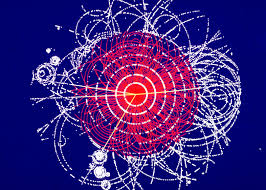Overview
The Higgs boson is an elementary particle that is different from all others in the Standard Model of Quantum Physics. It is essential to the process governing mass in the universe. Experiments at the Large Hadron Collider found a possible Higgs particle in 2012, and when it is brought online in 2015, more particles will be found.
What Is the Higgs Boson?
In the mid-1960’s, a number of theoretical physicists were working on ideas surrounding hidden symmetry of nuclear forces, what types of particles would carry forces, and how those fields would behave. One of those particles was a massive scalar boson that decayed very quickly, into photons, pairs of gauge bosons, bottom quarks, and leptons.
How Do Scientists Search for It?
Since subatomic particles are much too small to be observed directly, they are inferred from the evidence they leave behind. For example, charged particles in cosmic rays, such as electrons and positrons, produce tracks of water vapor as they move through a cloud chamber at nearly the speed of light. If particles, such as protons, are accelerated faster and faster until they are almost at the speed of light and then collide, the collision results in other particles, such as quarks, leptons, and bosons. The Higgs boson has been especially elusive, because it decays very quickly, at about 10-22 of a second. Combinations of experimental data lead researchers to believe that the particle at approximately 125 GeV, with zero spin and negative charge was possibly the Higgs boson.
Why Is It Important?
The Higgs boson is important evidence of a quantum Higgs field. That field produces the conditions by which some particles have mass. Without it, the universe as we know it would not exist. Elementary particles such as massive quarks, leptons such as electrons, and composites such as protons and neutrons, would not have any mass at all. They wouldn’t interact with one another to form atoms or molecules. Experimental discovery of the Higgs boson also is an indication that the Standard Model is valid to explain some universal physical concepts.
Where Will the Search Lead?
The Large Hadron Collider, CERN’s most powerful accelerator, is scheduled to go back online in 2015, after two years of maintenance upgrades. It will run at even higher energies, leading scientists to discover more about the physical universe, ask more questions, leading to exciting new theories and applications.
Interested in physics tutoring services? Learn more about how we are assisting thousands of students each academic year.
SchoolTutoring Academy is the premier educational services company for K-12 and college students. We offer tutoring programs for students in K-12, AP classes, and college. To learn more about how we help parents and students in Middlebury, VT: visit: Tutoring in Middlebury, VT




